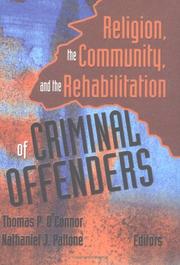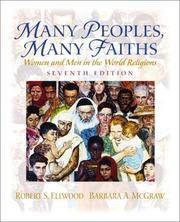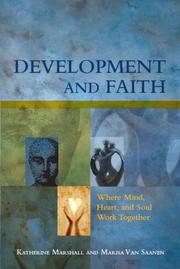| Listing 1 - 10 of 19 | << page >> |
Sort by
|

ISBN: 9780415914055 0415914043 9780415914048 0415914051 9781315022147 9781136666100 9781136666179 Year: 1996 Publisher: New York (N.Y.) Routledge
Abstract | Keywords | Export | Availability | Bookmark
 Loading...
Loading...Choose an application
- Reference Manager
- EndNote
- RefWorks (Direct export to RefWorks)
Religion has long played a central role in many social and political movements. Solidarity in Poland, anti-apartheid in South Africa, Operation Rescue in the United States--each of these movements is driven by the energy and sustained by the commitment of many individuals and organizations whose ideologies are shaped and powered by religious faith. In many cases, religious resources and motives serve as crucial variables explaining the emergence of entire social movements. This book analyzes contemporary social movements which are driven by people and organizations of faith. The essays also address many theoretical issues arising in the study of social movements and disruptive politics.
Social movements --- Religion and social problems --- Religious aspects --- Social action --- Social problems and religion --- Social problems --- Religion and social problems. --- Religious aspects.
Book
ISBN: 128338003X 9786613380036 1400842956 9781400842957 9781283380034 Year: 2012 Publisher: Princeton, NJ
Abstract | Keywords | Export | Availability | Bookmark
 Loading...
Loading...Choose an application
- Reference Manager
- EndNote
- RefWorks (Direct export to RefWorks)
Many scholars and citizens alike have counted on civic groups to create broad ties that bind society. Some hope that faith-based civic groups will spread their reach as government retreats. Yet few studies ask how, if at all, civic groups reach out to their wider community. Can religious groups--long central in civic America--create broad, empowering social ties in an unequal, diverse society? Over three years, Paul Lichterman studied nine liberal and conservative Protestant-based volunteering and advocacy projects in a mid-sized American city. He listened as these groups tried to create bridges with other community groups, social service agencies, and low-income people, just as the 1996 welfare reforms were taking effect. Counter to long-standing arguments, Lichterman discovered that powerful customs of interaction inside the groups often stunted external ties and even shaped religion's impact on the groups. Comparing groups, he found that successful bridges outward depend on group customs which invite reflective, critical discussion about a group's place amid surrounding groups and institutions. Combining insights from Alexis de Tocqueville, John Dewey, and Jane Addams with contemporary sociology, Elusive Togetherness addresses enduring questions about civic and religious life that elude the popular "social capital" concept. To create broad civic relationships, groups need more than the right religious values, political beliefs, or resources. They must learn new ways of being groups.
Small groups --- Associations, institutions, etc. --- Voluntarism --- Social action --- Religion and social problems --- Social problems and religion --- Social problems --- Religious aspects. --- Religious aspects
Book
ISBN: 1282272764 9786613815163 081353948X 9780813539485 0813538351 9780813538358 081353836X 9780813538365 Year: 2006 Publisher: New Brunswick, NJ : Rutgers University Press,
Abstract | Keywords | Export | Availability | Bookmark
 Loading...
Loading...Choose an application
- Reference Manager
- EndNote
- RefWorks (Direct export to RefWorks)
In Engaged Spirituality, Gregory C. Stanczak challenges this assumption, arguing that spirituality plays an important social role as well. Based on more than one hundred interviews with individuals of diverse faith traditions, the book shows how prayer, meditation, and ritual provide foundations for activism. Among the stories, a Buddhist monk in Los Angeles intimately describes the physical sensations of strength and compassion that sweep her body when she recites the Buddha’s name in times of selfless service, and a Protestant reverend explains how the calm serenity that she feels during retreats allows her to direct her multi-service agency in San Francisco to creative successes that were previously unimaginable. In an age when Madonna studies Kabbalah and the internet is bringing Buddhism to the white middle-class, it is clear that formal religious affiliations are no longer enough. Stanczak’s critical examination of spirituality provides us with a way of discussing the factors that impel individuals into social activism and forces us to rethink the question of how “religion” and “spirituality” might be defined.
Social change --- Religion and social problems --- Spirituality --- Spiritual-mindedness --- Philosophy --- Religion --- Spiritual life --- Social action --- Social problems and religion --- Social problems --- Religious aspects. --- Social aspects --- Religious aspects
Book
ISBN: 1315710978 1845533798 131749055X 1845537637 9781315710976 9781317490531 9781317490548 9781845533793 9781845533809 1317490541 9781845537630 1317490533 Year: 2008 Publisher: London ; Oakville : Equinox,
Abstract | Keywords | Export | Availability | Bookmark
 Loading...
Loading...Choose an application
- Reference Manager
- EndNote
- RefWorks (Direct export to RefWorks)
Conflict between the Israelis and the Palestinians has been ongoing since the creation of the state of Israel, a conflict revolving around land-ownership, water politics, human rights, and religious rights. Shalom/Salaam/Peace examines the realities of life in contemporary Israel/Palestine, with its politics, wars, security wall, settlements and ongoing struggles. Having established the historical, scriptural and theological context behind the present situation, the book presents key figures who have promoted peace and justice and explores liberation theology as a way of bringing peace in Israel/Palestine. Combining the history of liberation theology with its lived reality in Israel/Palestine today, Shalom/Salaam/Peace is an illuminating resource for students and scholars of politics and religion.
Arab-Israeli conflict --- Religion and social problems --- Liberation theology --- Theology of liberation --- Theology, Doctrinal --- Kairos documents --- Philosophy of liberation --- Social action --- Social problems and religion --- Social problems --- Religious aspects --- Judaism. --- Christianity. --- Islam.
Book
ISBN: 0429898150 0367103028 0429473389 1782413235 9781782413233 1782201785 9781782201786 1322949107 9781322949109 9781781814550 1781814554 9781782201786 0429912382 Year: 2018 Publisher: Boca Raton, FL : Routledge,
Abstract | Keywords | Export | Availability | Bookmark
 Loading...
Loading...Choose an application
- Reference Manager
- EndNote
- RefWorks (Direct export to RefWorks)
The art of living the "good life" requires skilful attunement to the lovely presences in everyday life. Lodged in a psychoanalytic sensibility, and drawing from ancient and modern religious and spiritual wisdom, this book provides the details, conceptual structures, and inner meanings of a number of easily accessible, everyday activities, including gardening, sport, drinking coffee, storytelling, and listening to music. It also suggests how to best engage these activities, to consecrate the ordinary in a way that points to experiential transcendence, or what the author calls "glimpsing immortality", a core component of the art of living the "good life".
Humanity. --- Religion and social problems. --- Social action. --- Social problems. --- Reform, Social --- Social reform --- Social welfare --- Social history --- Applied sociology --- Social policy --- Social problems --- Social action --- Social problems and religion --- Ethics --- Religious aspects

ISBN: 020304956X 1283968509 1136409246 9781136409240 0789019760 9780789019769 0789019779 9780789019776 9780203049563 9781136409387 1136409386 9781136409318 1136409319 Year: 2002 Publisher: New York : Haworth Press,
Abstract | Keywords | Export | Availability | Bookmark
 Loading...
Loading...Choose an application
- Reference Manager
- EndNote
- RefWorks (Direct export to RefWorks)
Explore the relationship between faith-based programs, religion, and offender rehabilitation! This book reports on current research from several disciplines to help the reader understand the nature and impact of the relationship between faith-based programs, religion, and offender rehabilitation. Religion, the Community, and the Rehabilitation of Criminal Offenders is a unique resource?there has been very little research published on this important topic. President Bush's faith-based initiative recognized that religion plays a role in the justice system and corrections that i
Criminals --- Religion and social problems. --- Religious work with prisoners. --- Prisoners --- Social action --- Social problems and religion --- Social problems --- Reform of criminals --- Rehabilitation of criminals --- Corrections --- Alternatives to imprisonment --- Rehabilitation. --- Religious aspects --- Rehabilitation

ISBN: 013034172X Year: 2002 Publisher: Upper Saddle River, NJ Prentice Hall
Abstract | Keywords | Export | Availability | Bookmark
 Loading...
Loading...Choose an application
- Reference Manager
- EndNote
- RefWorks (Direct export to RefWorks)
Book
ISBN: 9781783488940 1783488948 9781783488957 1783488956 9781783488964 1783488964 Year: 2017 Publisher: London ; New York : Rowman & Littlefield International,
Abstract | Keywords | Export | Availability | Bookmark
 Loading...
Loading...Choose an application
- Reference Manager
- EndNote
- RefWorks (Direct export to RefWorks)
The current refugee crisis sweeping Europe, and much of the world, closely intersects with largely neglected questions of religion. Moving beyond discussions of religious differences, what can we learn about the interaction between religion and migration? Do faith-based organisations play a role within the refugee regime? How do religious traditions and perspectives challenge and inform current practices and policies towards refugees? This volume gathers together expertise from academics and practitioners, as well as migrant voices, in order to investigate these interconnections. It shows that reconsidering our understanding and approaches to both could generate creative alternative responses to the growing global migration crisis. Beginning with a discussion of the secular/religious divide - and how it shapes dominant policy practices and counter approaches to displacement and migration - the book then goes on to explore and deconstruct the dominant discourse of the Muslim refugee as a threat to the secular/Christian West. The discussion continues with an exploration of Christian and Islamic traditions of hospitality, showing how they challenge current practices of securitization of migration, and concludes with an investigation of the largely unexplored relation between gender, religion and migration. Bringing together leading and emerging voices from across academia and practice, in the fields of International Relations, migration studies, philosophy, religious studies and gender studies, this volume offers a unique take on one of the most pressing global problems of our time.
Refugees --- Religion and social problems --- 241.65*3 --- Social action --- Social problems and religion --- Social problems --- Displaced persons --- Persons --- Aliens --- Deportees --- Exiles --- 241.65*3 Theologische ethiek: internationale rechtvaardigheid --- Theologische ethiek: internationale rechtvaardigheid --- Government policy --- Religious aspects --- Réfugiés --- Religion et problèmes sociaux --- Politique gouvernementale

ISBN: 0821371738 9786610940400 1280940409 0821371746 Year: 2007 Publisher: Washington DC : World Bank,
Abstract | Keywords | Export | Availability | Bookmark
 Loading...
Loading...Choose an application
- Reference Manager
- EndNote
- RefWorks (Direct export to RefWorks)
The faith and development nexus is both a promising new focus for secular development agencies and a historic reality: for centuries, world faiths and individuals inspired by their faith have played many roles in social change and social welfare. Secular development agencies have largely operated in parallel to the world of faith-motivated development. The World Bank began in the late 1990's to explore ways in which faith and development are connected. The issue was not and is not about religion, but about the recognition that some of the best experts on development are faith leaders living
Economic development -- Religious aspects. --- Poverty. --- Religion and social problems. --- Economic development --- Religion and social problems --- Poverty --- Economic Theory --- Business & Economics --- Religious aspects --- Religious aspects. --- Destitution --- Social action --- Social problems and religion --- Moral and religious aspects --- Wealth --- Basic needs --- Begging --- Poor --- Subsistence economy --- Social problems
Book
ISBN: 9781845455767 1845455762 Year: 2009 Publisher: New York: Berghahn,
Abstract | Keywords | Export | Availability | Bookmark
 Loading...
Loading...Choose an application
- Reference Manager
- EndNote
- RefWorks (Direct export to RefWorks)
Social service --- Social security --- Religion and social problems --- Religion --- Social networks --- Religious aspects --- Economic aspects --- 369 --- Networking, Social --- Networks, Social --- Social networking --- Social support systems --- Support systems, Social --- Interpersonal relations --- Cliques (Sociology) --- Microblogs --- Religion and economics --- Social action --- Social problems and religion --- Social problems --- Sociale verzekering --- Social service - Religious aspects --- Social security - Religious aspects --- Religion - Economic aspects
| Listing 1 - 10 of 19 | << page >> |
Sort by
|

 Search
Search Feedback
Feedback About UniCat
About UniCat  Help
Help News
News